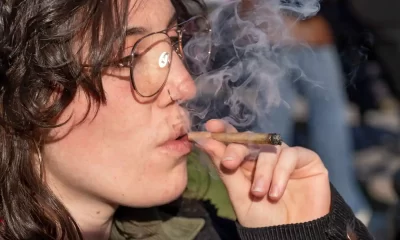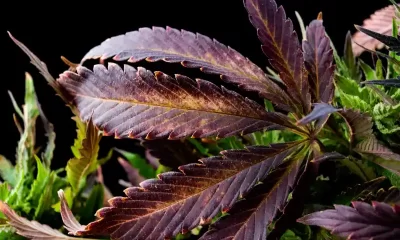Business
Australian Activists Face Charges for 4/20 Sydney Opera House Projection Protest

Two Australian cannabis activists facing charges for projecting pro-cannabis messages on the Sydney Opera House last year during a 4/20 protest demonstration argue their actions are constitutionally protected political expression.
Two activists in Australia are facing criminal charges for projecting pro-cannabis messages on the Sydney Opera House, one of the most recognizable landmarks in the world. The activists, Alec Zammitt and Will Stolk, projected a dancing pot leaf and other images on the famed venue on April 20, 2022, timing their protest against the continued prohibition of marijuana in Australia to coincide with the cannabis community’s 4/20 high holiday.
A month before the 4/20 demonstration, Zammitt had conducted a trial run of the protest in which he projected images for a short time onto the Sydney Opera House from the Park Hyatt Hotel, a location with sweeping views of the iconic landmark and nearby Sydney Harbour Bridge. The images, which left no permanent mark on the structure, included cannabis leaves and the numeral 420, among others, and the phrase “Who are we hurting?” a primary theme of the activists’ protest.
Zammitt was contacted by police detectives, who visited his home the following day to conduct an interview. Before concluding the interview, the detectives told him that they were not sure if what he had done was an offense and said they would seek internal legal advice and contact him after a day’s time. When that didn’t happen, the activists believed they were in the clear and planned their next demonstration for 4/20.

4/20 Demonstration Interrupted By Police
After returning to the Park Hyatt Hotel early on the morning of April 20, Zammitt and Stolk, who freely admit their actions, used laser projectors to again project the pro-cannabis imagery onto the Sydney Opera House and the Sydney Harbor Bridge. Before long, however, the protest was shut down by the authorities.
“The police ended up raiding the hotel suite where the projectors were set up. They issued me with an offense relating to the month prior as well as a new offense for the 4/20 projections,” Zammitt wrote in an email to High Times. “They also charged Will with the same offense under section 9 G of the Opera House Trust By-Laws.”
Zammitt went on to explain that the offense relates to “Distribution of advertisement etc. on Opera House Premises,” noting that there is similar legislation relating to the Sydney Harbour Bridge, on which the activists also projected pro-cannabis messages. So far, police have chosen not to pursue charges in relation to that part of the demonstration, however.
Stolk and Zammitt are fighting the charges against them, arguing that their actions did not constitute a commercial advertisement but were instead a constitutionally protected protest of Australia’s prohibition of cannabis and a message of support for reform legislation being debated in the New South Wales (NSW) Parliament.
After being informed by the activists’ legal counsel that they would bring constitutional challenges to the charges against them, prosecutors changed their approach and agreed that rather than a commercial advertisement, Zammitt and Stolk’s actions were a political protest. However, they are continuing the proceedings and requiring the pair to present their constitutional defense in court.
Activists Appear In Court Next Week
On January 31, Stolk and Zammitt face a hearing in the case, where the NSW attorney general’s office will indicate if it will oppose the activists’ defense based on political expression or communication. If the attorney general opposes the defense, the matter will be set for a constitutional hearing.
If the case goes to trial and the activists are convicted of the charges against them, Stolk faces a fine of up to $1,100, while Zammitt’s penalty could be twice that due to the second charge for the trial run. Zammitt hopes the court proceedings bring attention to the continued prohibition of cannabis in Australia and amplify their “Who are we hurting?” message. He added that he has retained an attorney renowned for his work with constitutional defenses related to political expression and expects prosecutors to drop the charges before the case goes to the Australian High Court.
Stolk said he is tempted to pay the fine and be finished with the matter, but the case’s constitutional implications and his desire to continue spreading a pro-cannabis message keep him in the fight.
“We did this for a reason, and the reason was to firmly express our opinion and political belief that we should legally be allowed to consume and sell recreational cannabis just like we do alcohol and just like our brothers and sisters get to do in numerous legal states in the USA, in countries like Canada, Holland and Thailand, and soon even Germany,” Stolk wrote in an email. “We believe that the current Australian laws are stuck in the 1800s and we believe that it’s our constitutional right to be able to protest and express our political opinions.”
He also notes that the basis of the protest is the desire of many Australians to be able to smoke a joint without fear of reprisal from the government. He adds that it is a matter of personal freedom, something his grandfather fought for in World War 2, spending five years in a Nazi POW camp.
“I personally feel that if we give these corrupt politicians an inch they will take a mile,” Stolk asserts. “So as we are now in the position to take one for the team and stand up for our constitutional rights I think that no matter what the outcome it’s our duty as Australians to defend our freedoms that our ancestors fought so hard to protect.”
Business
New Mexico cannabis operator fined, loses license for alleged BioTrack fraud

New Mexico regulators fined a cannabis operator nearly $300,000 and revoked its license after the company allegedly created fake reports in the state’s traceability software.
The New Mexico Cannabis Control Division (CCD) accused marijuana manufacturer and retailer Golden Roots of 11 violations, according to Albuquerque Business First.
Golden Roots operates the The Cannabis Revolution Dispensary.
The majority of the violations are related to the Albuquerque company’s improper use of BioTrack, which has been New Mexico’s track-and-trace vendor since 2015.
The CCD alleges Golden Roots reported marijuana production only two months after it had received its vertically integrated license, according to Albuquerque Business First.
Because cannabis takes longer than two months to be cultivated, the CCD was suspicious of the report.
After inspecting the company’s premises, the CCD alleged Golden Roots reported cultivation, transportation and sales in BioTrack but wasn’t able to provide officers who inspected the site evidence that the operator was cultivating cannabis.
In April, the CCD revoked Golden Roots’ license and issued a $10,000 fine, according to the news outlet.
The company requested a hearing, which the regulator scheduled for Sept. 1.
At the hearing, the CCD testified that the company’s dried-cannabis weights in BioTrack were suspicious because they didn’t seem to accurately reflect how much weight marijuana loses as it dries.
Company employees also poorly accounted for why they were making adjustments in the system of up to 24 pounds of cannabis, making comments such as “bad” or “mistake” in the software, Albuquerque Business First reported.
Golden Roots was fined $298,972.05 – the amount regulators allege the company made selling products that weren’t properly accounted for in BioTrack.
The CCD has been cracking down on cannabis operators accused of selling products procured from out-of-state or not grown legally:
- Regulators alleged in August that Albuquerque dispensary Sawmill Sweet Leaf sold out-of-state products and didn’t have a license for extraction.
- Paradise Exotics Distro lost its license in July after regulators alleged the company sold products made in California.
Golden Roots was the first alleged rulebreaker in New Mexico to be asked to pay a large fine.
Source: https://mjbizdaily.com/new-mexico-cannabis-operator-fined-loses-license-for-alleged-biotrack-fraud/
Business
Marijuana companies suing US attorney general in federal prohibition challenge

Four marijuana companies, including a multistate operator, have filed a lawsuit against U.S. Attorney General Merrick Garland in which they allege the federal MJ prohibition under the Controlled Substances Act is no longer constitutional.
According to the complaint, filed Thursday in U.S. District Court in Massachusetts, retailer Canna Provisions, Treevit delivery service CEO Gyasi Sellers, cultivator Wiseacre Farm and MSO Verano Holdings Corp. are all harmed by “the federal government’s unconstitutional ban on cultivating, manufacturing, distributing, or possessing intrastate marijuana.”
Verano is headquartered in Chicago but has operations in Massachusetts; the other three operators are based in Massachusetts.
The lawsuit seeks a ruling that the “Controlled Substances Act is unconstitutional as applied to the intrastate cultivation, manufacture, possession, and distribution of marijuana pursuant to state law.”
The companies want the case to go before the U.S. Supreme Court.
They hired prominent law firm Boies Schiller Flexner to represent them.
The New York-based firm’s principal is David Boies, whose former clients include Microsoft, former presidential candidate Al Gore and Elizabeth Holmes’ disgraced startup Theranos.
Similar challenges to the federal Controlled Substances Act (CSA) have failed.
One such challenge led to a landmark Supreme Court decision in 2005.
In Gonzalez vs. Raich, the highest court in the United States ruled in a 6-3 decision that the commerce clause of the U.S. Constitution gave Congress the power to outlaw marijuana federally, even though state laws allow the cultivation and sale of cannabis.
In the 18 years since that ruling, 23 states and the District of Columbia have legalized adult-use marijuana and the federal government has allowed a multibillion-dollar cannabis industry to thrive.
Since both Congress and the U.S. Department of Justice, currently headed by Garland, have declined to intervene in state-licensed marijuana markets, the key facts that led to the Supreme Court’s 2005 ruling “no longer apply,” Boies said in a statement Thursday.
“The Supreme Court has since made clear that the federal government lacks the authority to regulate purely intrastate commerce,” Boies said.
“Moreover, the facts on which those precedents are based are no longer true.”
Verano President Darren Weiss said in a statement the company is “prepared to bring this case all the way to the Supreme Court in order to align federal law with how Congress has acted for years.”
While the Biden administration’s push to reschedule marijuana would help solve marijuana operators’ federal tax woes, neither rescheduling nor modest Congressional reforms such as the SAFER Banking Act “solve the fundamental issue,” Weiss added.
“The application of the CSA to lawful state-run cannabis business is an unconstitutional overreach on state sovereignty that has led to decades of harm, failed businesses, lost jobs, and unsafe working conditions.”
Business
Alabama to make another attempt Dec. 1 to award medical cannabis licenses

Alabama regulators are targeting Dec. 1 to award the first batch of medical cannabis business licenses after the agency’s first two attempts were scrapped because of scoring errors and litigation.
The first licenses will be awarded to individual cultivators, delivery providers, processors, dispensaries and state testing labs, according to the Alabama Medical Cannabis Commission (AMCC).
Then, on Dec. 12, the AMCC will award licenses for vertically integrated operations, a designation set primarily for multistate operators.
Licenses are expected to be handed out 28 days after they have been awarded, so MMJ production could begin in early January, according to the Alabama Daily News.
That means MMJ products could be available for patients around early March, an AMCC spokesperson told the media outlet.
Regulators initially awarded 21 business licenses in June, only to void them after applicants alleged inconsistencies with how the applications were scored.
Then, in August, the state awarded 24 different licenses – 19 went to June recipients – only to reverse themselves again and scratch those licenses after spurned applicants filed lawsuits.
A state judge dismissed a lawsuit filed by Chicago-based MSO Verano Holdings Corp., but another lawsuit is pending.
Source: https://mjbizdaily.com/alabama-plans-to-award-medical-cannabis-licenses-dec-1/
-

 Business2 years ago
Business2 years agoPot Odor Does Not Justify Probable Cause for Vehicle Searches, Minnesota Court Affirms
-

 Business2 years ago
Business2 years agoNew Mexico cannabis operator fined, loses license for alleged BioTrack fraud
-

 Business2 years ago
Business2 years agoAlabama to make another attempt Dec. 1 to award medical cannabis licenses
-

 Business2 years ago
Business2 years agoWashington State Pays Out $9.4 Million in Refunds Relating to Drug Convictions
-

 Business2 years ago
Business2 years agoMarijuana companies suing US attorney general in federal prohibition challenge
-

 Business2 years ago
Business2 years agoLegal Marijuana Handed A Nothing Burger From NY State
-

 Business2 years ago
Business2 years agoCan Cannabis Help Seasonal Depression
-

 Blogs2 years ago
Blogs2 years agoCannabis Art Is Flourishing On Etsy













